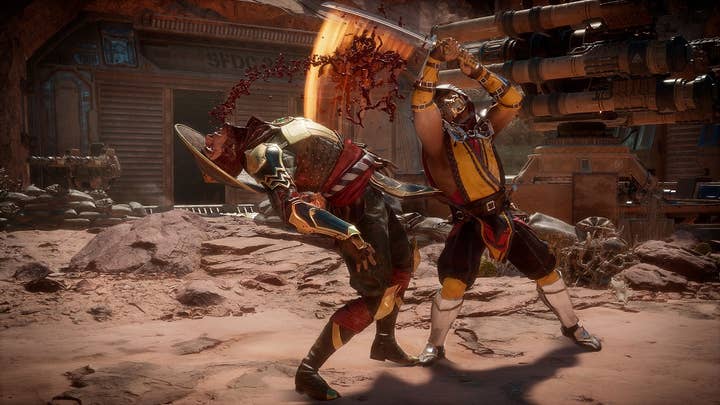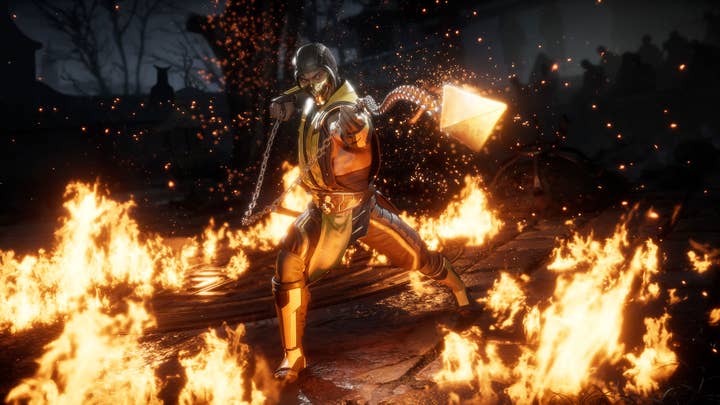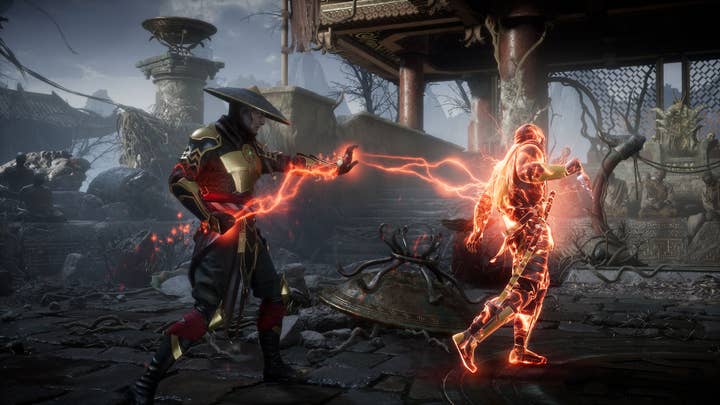NetherRealm's self-sustaining culture of crunch
Current and former employees describe pressures at Mortal Kombat studio placed on them from management and peers alike
There's a snowball effect happening around crunch stories in the games industry. Last week, Polygon wrote about years of crunch at Epic Games precipitated by the phenomenal success of Fortnite.
That story in turn prompted former NetherRealm Studios developer James Longstreet to take to Twitter and talk about his experiences at the company on 2011's Mortal Kombat, which he said "nearly killed me."
Ex-NetherRealm artist Beck Hallstedt then quoted Longstreet's tweet thread to add their own experience at the studio, saying it needed to be "exposed for predatory and abusive behaviors," particularly in the way it deals with contractors.
In the time since, PC Gamer and USgamer have published their own stories about NetherRealm's working conditions, each sourcing four former contractors. For this article, GamesIndustry.biz has spoken with nine current and former NetherRealm full-time employees and contractors. Other publications have been openly seeking NetherRealm developers to share their stories, so it's entirely possible this will not be the last such article on the subject.
Under Pressure

We heard a wide variety of crunch experiences, with some reporting hardly any crunch at all. One current employee said it can vary significantly from person to person, and is more likely to affect design, programming, and QA while the core tech, cinematics or animation teams might not have it as rough. That said, the people who did crunch often crunched hard, and for extended periods of time.
"I was doing 90-hour work weeks for about four months straight without a day off," one former employee said of working on NetherRealm's 2013 game Injustice. "This included working on Saturday and Sunday. I think the most hours I ever worked in a week was 115."
Others reported 100-hour work weeks on Mortal Kombat X and Injustice 2 as well. One contractor said they worked 12 hours or more, seven days a week, for six straight months leading up to the launch of Mortal Kombat X.
"You feel like you wake up, go to work, go home and sleep. There's no time for family, no time for friends or socializing or any work at home"
"It's emotionally draining," a current employee said. "It's physically draining. You feel like you wake up, go to work, go home and sleep. There's no time for family, no time for friends or socializing or any work at home. It's just work. That's what you do for that portion of your life. And it feels shitty. You feel bad after you do it, physically and emotionally."
Maintaining healthy habits can also be challenging in the midst of crunch.
"We had food orders every day during crunch and I would eat an entire pizza," one former employee said. "We also had an infinite supply of sodas in the kitchen. By the end of my day I would drink eight to 12 bottles of Mountain Dew."
Some said they found it hard to stay on top of everyday necessities during crunch, from getting enough sleep to doing laundry and even basic hygiene.
Another point where accounts varied greatly was whether these developers knew what to expect regarding crunch when they were first hired. A number said interviewers referred to crunch through euphemisms, with one told the team would often be "coming in hot" for submission deadlines.
Others said they weren't warned that the job involved crunch, but had assumed it anyway. One called it "the elephant in the room" during the interview process, saying they believed everybody understood there would be crunch, but adding that everybody had different ideas of what constitutes crunch.
But for at least one contractor we spoke to, it was still a surprise.
"I had no idea," they said. "I was in my early 20s, recently out of school, and just floored I could tell my friends I'd be working somewhere they'd heard of."
One commonality between the developers' accounts regardless of when they worked at the studio is that crunch at NetherRealm is expected, but not explicitly mandated.
"It's like a proving ground. You're trying to prove yourself so you're willing to put up with a lot more abuse than most people would"
"It wasn't a 100%, gun-to-the-head sort of thing," one said. "It was the sly thing where they say, 'We're not making anybody work overtime. We're not making anyone do anything.' But you look at the schedule and you know how long everything takes to make... They look at the amount of work they need to get done, and if it doesn't get done, [management] has the reason to [fire you]. It's a tricky maneuver where they can claim innocence in the fact they didn't make anyone do anything, but it's really by coercion."
One said the closest they had ever come to crunch being mandated to them was when they questioned the workload they had been assigned. A supervisor told them they could have less if they found another developer to agree to take the extra tasks in their place, but added that their coworkers might resent them for leaving at a reasonable hour while offloading work onto others.
One current developer said they know it's crunch time when the studio starts buying people dinner for people who stay late.
"That's more or less when the crunch time starts, when those food orders are active. And that will be for a period of months."
For Mortal Kombat 11, those food deliveries began in November. After the game launched last month, employees were told that the dinners would also be ending. But that notice was soon followed by another email saying lots of employees still wanted the dinner deliveries so the studio would keep doing it.
"I see that as their soft way of enforcing the boundaries of the crunch period," they said. "And they do nothing to reduce that amount. If you went by that boundary, crunch has been going on since November, and it's still ongoing."
Some admitted they were putting the pressure to crunch on themselves.
"It was my first gig at a studio," one explained. "It's like a proving ground. You're trying to prove yourself so you're willing to put up with a lot more abuse than most people would."
A number of people found the company culture glorified crunch, further exacerbating the situation.
"Quickly after I started, people were taking about earlier crunch times as battle scars," a former contractor said. "Sleeping under desks. Working until 2 or 3 a.m. This was a point of pride for people."
"The more I talk about it the more it becomes super obvious that I was being taken advantage of"
While some of the people we spoke to stressed their direct supervisors did try to have their backs, there was general agreement that management was not going to step in to protect people from themselves.
"Nobody ever came up to me and said 'Hey, go home and get some rest. This work will be there for you later,'" one former employee told us. "Instead, I was always under the impression that I was being tested. The more I talk about it the more it becomes super obvious that I was being taken advantage of."
And when people don't naturally fall in line with the company culture, there are significant social pressures to change their behavior.
"Your coworkers would make fun of you or look down on you if you didn't put in the hours," one former employee said. A current NetherRealm developer confirmed that, saying, "If you do stay late and other people leave at a normal hour, you'll hear people who did stay late talking badly about the ones who left. 'Oh, he's not here so he must not care about the game,' that sort of stuff."
The same developer said studio leadership sets the tone by putting in excessive hours of their own, creating an expectation that, "This is how we do things around here." Others agreed that the crunch culture begins with studio leadership, but not necessarily for that reason.
"Almost all of the leadership has been at this company on this team for a decade," a current employee said. "I feel like their perspective is almost always, 'Oh it's better than it was ten years ago. Ten years ago it was crazy.' So they see it as, 'Well this is fine. This is so much better than it was.' Instead of the perspective of, 'It's still bad and we need to improve on it."
Problem? What Problem?

That was another common sentiment among the developers we spoke with. None could recall studio leadership ever acknowledging that crunch was undesirable, or making an effort to change practices with the goal of reducing or eliminating crunch.
"The leadership position is that this is how it has to be," a current employee said. "This is what game development is."
A number of other developers expressed frustration with what they saw as mismanagement at NetherRealm, which they said aggravated the crunch problem in a number of ways.
A former QA contractor reported having to work weekends during crunch without actually having critical work to do because builds were late. Another said their time with the company was marked by a lot of "hurry up and wait," with one former contractor talking about entire departments left idling on Mortal Kombat X while they were dependent on other departments who were running late on their own commitments.
"There's been no change in how we're going to proceed with our DLC schedule going forward. There's been no talk of our next project or what we'll do differently"
"All the complaints people have are related to one another," one current employee said. "They're all tied to one another. The biggest one is crunch, but the cause of that is poor communication within the studio... Communication at NetherRealm is very, very, very poor. Nobody knows that everything's on fire and there's a problem until things should have been due a week and a half ago."
As an example, they described the MK Day press event in Los Angeles and London that would serve as the game's public debut. The event was January 17, but the developer said it was "thrown onto the team" in early-to-mid December. They said the team was already behind schedule and was originally told the MK Day would use pre-existing assets and require little to no time from developers. However, the company decided to show a playable build at the event, which the developer said required a significant number of people to spend a month getting ready, putting them even further behind.
"It has ripple effects," they said. "We're already poor at communication, and now we're having last-minute PR events come up. We're already two to three months behind, and now we all have to stay even longer to get all this stuff working to show that we have our shit together, when actually no we don't."
There was also frustration about inertia at NetherRealm preventing the studio from acknowledging mistakes, much less fixing them. Current employees said there will be proper post-mortems on a department level, but nothing as rigorous on a studio-wide scale to address more systemic issues that could be contributing to crunch.
Even with the recent reports and Twitter threads about NetherRealm's crunch and practices, current employees said the studio has been almost silent on the issue internally, choosing only to remind developers of its social media policy and "highly suggest" they not comment in public.
"There's been no change in how we're going to proceed with our DLC schedule going forward," one developer noted. "There's been no talk of our next project or what we'll do differently."
"A lot of more recent hires are fed up and not satisfied with the current conditions"
The attitude that there's nothing wrong to fix seems to be present among the rank-and-file developers as well.
"The sentiment and overall feeling of all this in the studio right now is that mostly everybody there who's full-time or has been there long enough is no-selling it," one said, adding, "Everyone in the studio is downplaying it. I'm against all of it. I'm against all the crunch. I'm against how everything's happened so far. But if I say anything, everyone's immediately going to look at me like I'm a fucking alien. The conversation isn't being had, and it's probably not going to."
Another current employee was slightly more optimistic.
"The developers who were more recently hired are much more reactive to stories about crunch and trying to actively reduce crunch," they said. "There's definitely a bottom-up effort. A lot of more recent hires are fed up and not satisfied with the current conditions."
Whether those recent hires will stick around and change the studio is another matter.
Disposable Developers

We spoke with a number of former employees who were fed up and unsatisfied with NetherRealm, but they burned out or left for better work situations. NetherRealm contractors we spoke with felt particularly wronged by the studio, with several using the phrase "second-class citizens" to describe their treatment.
Contractors reported earning as little as $11 an hour. One said when the studio required them to work overtime, it was portrayed to them as a generous opportunity to earn a little more money, an offer many felt compelled to accept given how difficult it was to get by on their basic wages.
A number of former contractors told us they were compelled to work the extra hours in part because of a company policy that limited their terms. We were told NetherRealm typically signs contractors to nine-month terms and then waits a few months to bring them back on another contract to avoid having to carry them as full-time employees with benefits.
"You felt like a body crammed into a corner. Basically, you're just a cog in the machine to turn out the product they want"
"Their shtick is to carry you on as a contractor for nine months when they need you, dangle the carrot of full-time employment in front of you to get you to get in those extra hours, and then after that throw you to the curb," one said.
Another noted that contractors are commonly referred to as interns, and viewed by full-timers as a pain to deal with rather than a colleague there to help create the game. They distilled that sentiment with a story about a particularly discouraging moment with NetherRealm president Shaun Himmerick at a company function at a bar.
"I overheard him saying, 'Well, it's OK, interns aren't really people,'" they said. "I was pretty floored to hear him say it. He said it in a joking way, but why would you even make a joke about that if there wasn't any sort of seriousness rooted in that? It's dehumanizing. You felt like a body crammed into a corner. Basically, you're just a cog in the machine to turn out the product they want."
The USgamer report went further into Himmerick's treatment of contractors, detailing an emergency meeting after some details for Injustice 2 leaked online. After the leak, Himmerick called the contractors in for a meeting to discuss NDA issues, during which he reportedly threatened and berated contractors, accusing them of being the source of the leak. (As USgamer's Mike Williams pointed out, Himmerick was apparently less concerned about leaks years earlier when he let slip to the press news of the PlayStation Vita's existence.)
It wasn't just executives looking down on contractors. Even within their own ranks, there was a pecking order. One former QA contractor said that when the team expanded during crunch time, the pre-existing contractors would refer to the pod where the new people worked as "the exile room," adding, "They were lesser people. They were disposable. They were likely never going to come back."
"With how hard it is to get your foot in the door in the industry, is it more important to get a shipped AAA title early on, or to not to be exploited for it?"
One former contractor said that they knew NetherRealm had a reputation at Chicago-area schools as a rough place for aspiring developers, but they went ahead in pursuing a job there anyway.
"It's an incredibly difficult decision to make," they explained. "With how hard it is to get your foot in the door in the industry, is it more important to get a shipped AAA title early on, or to not to be exploited for it?"
For some, that foot in the door wasn't as helpful in landing future employment as they had hoped. For one thing, the work they performed at the studio is under NDA, so depending on what they were working on and what's been announced, they may not be able to show that work to prospective employers. For another, a number of people we spoke with confirmed a company policy prohibiting writing letters of recommendation for past or present employees.
"It didn't really seem to serve any purpose other than to screw you over, job-wise," one former contractor said, adding, "They can't vouch for you and you can't vouch for you [with your work]. You can have a bullet on your resume that says you worked there, but you're kind of [shit out of luck] otherwise."
Just how widely known or enforced that policy may be is not clear. A number of current and former employees we spoke to were unaware of this policy, and some even being aware of people at the studio giving or receiving recommendations. Regardless, a source with knowledge of the policy told us it is not specific to the studio, but rather a rule NetherRealm parent company Warner Bros. applies across the entire company and its subsidiaries.
Women Weren't Welcome

Contractors weren't the only people we spoke with who were made to feel second-class by the NetherRealm culture.
"The studio atmosphere was incredibly bro-centric, with straight white male being the default," one woman who used to work at the studio said. "Complaints about women were a daily occurrence around me, and speaking up was typically met with, 'You're not going to get me in trouble with HR, right?'"
"The boy's club culture makes it really clear to anyone that isn't a dude that they're not welcome"
Different people we spoke to talked about rape jokes being circulated around the company email, artists displaying posters of lingerie models at their desks "for inspiration," and "borderline SFW" desktop backgrounds.
"The boy's club culture makes it really clear to anyone that isn't a dude that they're not welcome," one former contractor said.
A current employee confirmed that the studio has had problems with inclusivity in the past, but said things have slowly gotten better. The explicit posters aren't around any more, they said, and the studio has increased its diversity beyond straight white men considerably in the past three or four years, in both contractor and full-time positions.
As for why it had problems in the first place: "I think that came with the culture left over from a lot of these older employees who used to be Midway. I hate the term, but 'because it was a different time,' I guess to them it was normal."
That same employee said the company has also become smarter in how it treats contractors, bringing talent on full-time more often rather than just giving them a succession of contracts until they realize they can get a better job elsewhere.
"Back in the day, people were just happy to be making video games and that provided a lot of value to them," another current employee said. "This is their dream job and it's crazy for them to even be working in video games. And some of those people are still around. Some are still at NetherRealm.
"But for the newer people, this is their job. This is a career for them, and they're treating it like a career instead of a dream come true. So they're expecting to be treated like real employees, with reasonable work conditions and expectations."
Some of the former NetherRealm developers we spoke with have left the games industry entirely. Some have stayed, but found other employers. Almost all said they have found better places to work.
"It took me years to get over the mentality that crunch is just a thing you do because that's how games are made," one of the former employees said. "It wasn't until the higher ups at my current job sat me down and told me that my life is important that I ever changed the way I looked at things. There are zero pressures or expectations to work beyond 40 hours a week."
GamesIndustry.biz has reached out to Warner Bros. Interactive Entertainment for comment.

